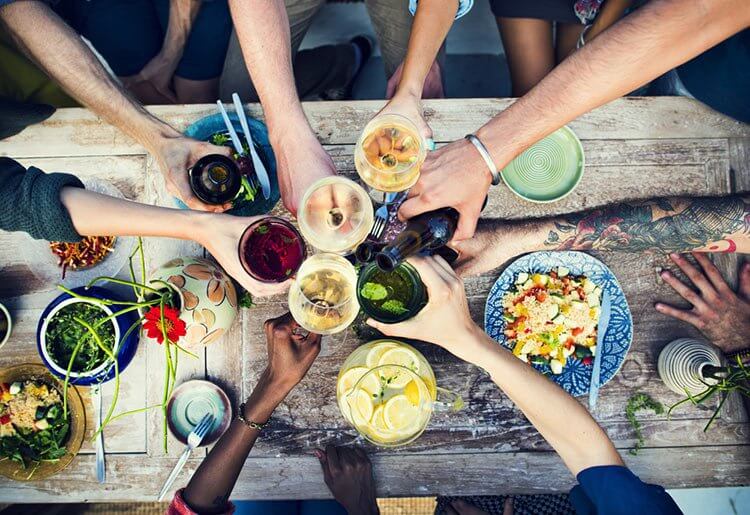
I was standing at the kitchen sink, sectioning and devouring a juicy orange, when my housemate Joe walked in. “You eat like a bachelor!” he exclaimed, amused. “Take a plate and sit at the table.” But I was being practical: the orange was so juicy it made more sense to peel and eat it over the sink.
I recalled this long-ago scene as I stood at my kitchen sink peeling a ripe mango, juice spurting everywhere. Mangos rank with lobsters in terms of difficulty eating without making a Class 5 mess. Smiling, I pondered Joe’s advice.
Treating Yourself As If You Count
The truth is, in my daily life I don’t eat like a bachelor, which conjures images of someone grabbing questionable food from the fridge (yogurt past its sell-by date?), or eating on the run.
Most evenings I eat a healthy dinner with the intent to nourish my body/being. One favorite is wild-caught salmon with quinoa and organic asparagus. A few years ago I invited a friend over and served this meal. He declared, “Wow, you treat yourself well!” He considered it extravagant to prepare a sit-down meal just for myself — or even for the two of us.
Yet how and what we eat is a critical aspect of self-care. Eating nutritious food in a calm, nurturing setting is healing on many levels (“nutritious,” from the Latin, actually means, “that nourishes”). In our chaotic, distractible age, “slow food” is a gift we can give ourselves that makes a significant difference.
Fork Lift: A Moveable Feast for Stomach and Soul
Millennials are hungry for inspired food and the social currency it represents, says Eve Turow, author of A Taste of Generation Yum. And startups such as Feastly — a platform that enables chefs to prepare and serve meals all over the world, regardless of their culinary cred — are introducing new meaning to “soul food”.
From grandmother-type cooks whose traditional dishes don’t appear in any commercial space, to professional chefs looking to build their brand, new food apps are infusing food with passion and purpose. “These chefs are artists, and that’s how we look at them: bringing that creativity back into what food is about, the stories behind it, and who’s interacting with the food around them,” explains Feastly founder Noah Karesh.
This connection to authenticity and adventure is light years from a burrito on the run, or sticking a fork into sad looking leftovers. But you don’t have to splash out on an elaborate dining experience to change the essence of how you eat.
People — especially Millennials, who’ve grown up with technology — are yearning for a deeper sense of connection, both with one another and with how their food is sourced. “Food is the anti-technology,” says Turow. People want something tangible they can see and feel and taste.
And we hunger for community. Karesh observes, “Someone can have 5000 Facebook ‘Friends’ but they’re still eating alone — how rich of a life are they living? We’re bringing people back to the original social network, which is across the dining room table.”

For True Nourishment, Follow These 5 Steps
How can you embrace a healthier relationship with food?
- Take an honest look at how, what and why you eat, and whether you have “bachelor” tendencies — regardless of your gender or marital status.
- If you “eat like a bachelor” much of the time, reevaluate whether this is serving your highest good. Even bona fide bachelors enjoy a healthy, nourishing meal now and then.
- Choose to eat slow food for a few weeks and see how you feel. It’s surprisingly easy to create simple, tasty meals with fresh, organic ingredients. The key word is “simple”. Once you train your tastebuds to enjoy healthy meals, fast food will become repugnant. Seriously.
- When you sit down to dine, even if it’s on Chinese take-out or pizza (one of the maxims of change is, begin where you are), breathe deeply — and put down that phone. Your digestion will improve, along with your mood.
- Invite your friends (actual, not virtual) to join this slow food experiment. Sharing meals with those we love is a sorely needed ritual for a starving spirit. It becomes soul nourishing at an even deeper level when we join hands to thank the growers and grocers who’ve brought the food from farm to fork.
Give it a try. Oh, and when you do decide to dive into a juicy orange or mango, lean over the sink. It’s only practical.
